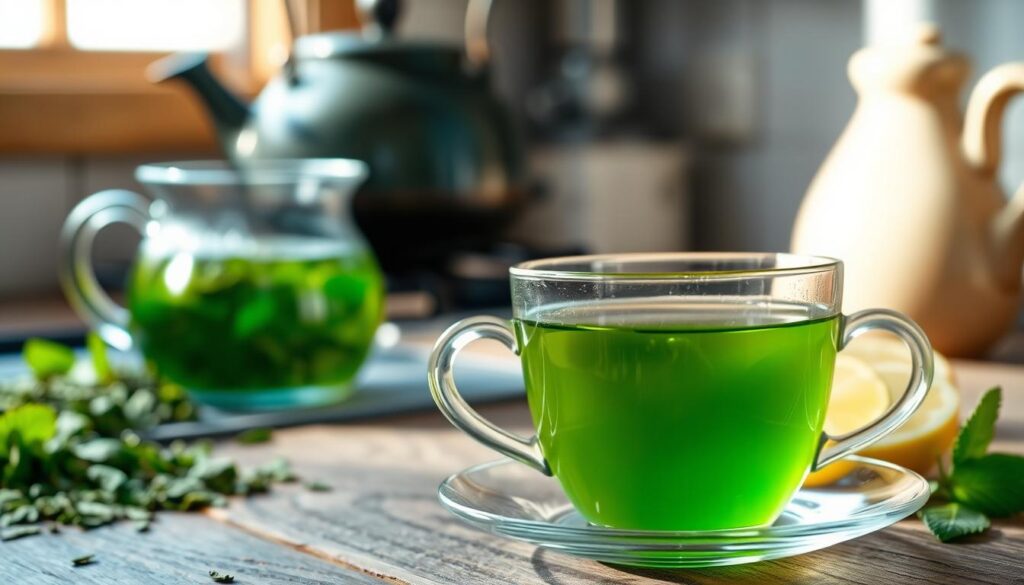Did you know green tea is great for your gut? It’s packed with antioxidants and anti-inflammatory properties. This makes it a powerful ally for your digestive health. But, with so many green teas out there, how do you pick the best one?
In this guide, we’ll show you the top green teas for a healthy gut. We’ll explore matcha’s antioxidant strength and the calming effects of loose-leaf teas. Our research will help you find the best green tea for your intestines.
Key Takeaways
- Green tea is rich in antioxidants that can support gut health and reduce inflammation
- Certain green tea products contain higher levels of beneficial compounds like EGCG
- Loose-leaf and matcha green teas may offer more potent digestive benefits
- Organic and high-quality green teas are essential for optimal intestinal health
- Proper brewing and dosage are crucial for maximizing the gut-friendly properties of green tea
What is Green Tea?
Green tea is a favorite drink that people have loved for centuries. It’s known for its unique taste and many health benefits. It comes from the leaves of the Camellia sinensis plant. Green tea is special because it has lots of antioxidants called polyphenols, especially epigallocatechin gallate (EGCG).
Benefits of Green Tea
Green tea offers many health benefits. It’s good for your digestive system, reduces inflammation, and boosts your immune system. These benefits come from the green tea’s polyphenol content, which includes antioxidants that help keep you healthy.
Green tea may also help with weight loss, improve brain function, and lower the risk of heart disease and some cancers. The health benefits of green tea make it a superfood that should be part of a healthy lifestyle.
| Nutrient | Composition in Green Tea |
|---|---|
| Polyphenols | 30% of the dry weight |
| Caffeine | Approximately 3% of the dry weight |
| Amino Acids | Approximately 4% of the dry weight |
| Vitamins and Minerals | Trace amounts of vitamins C, E, and K, as well as minerals like manganese and chromium |
The amazing green tea composition and its antioxidants make it a health powerhouse. Adding green tea to your daily routine is an easy way to get many health benefits and support your body’s functions.
Health Benefits of Green Tea
Green tea has been studied a lot, and it seems to have many health benefits. The key is the polyphenols, especially epigallocatechin gallate (EGCG). This compound is thought to be behind many of green tea’s health benefits.
Green tea is great for heart health. It can lower cholesterol and improve blood vessel function. It may also help prevent certain cancers, like breast and prostate cancer, because of its anti-inflammatory and antioxidant properties.
Green tea also benefits gut health. Its polyphenols can change the gut microbiome for the better. This can lead to better digestion and might even help with weight loss.
Green tea can also help with weight loss. The caffeine and catechins in it may boost metabolism and fat burning. But remember, green tea should be part of a healthy diet and lifestyle, not the only solution.
“Green tea has been a subject of intense scientific scrutiny, and the evidence suggests it offers a wide range of potential health benefits, from heart health to gut health and beyond.”
In short, green tea is amazing for your health. It’s good for your heart, gut, and might even help with weight loss. Adding green tea to your daily routine could be a simple way to improve your health.
CL’s Test Results on Green Tea Products
Green tea quality and potency can differ a lot between brands. ConsumerLab, a top testing group, has done deep research on green tea supplements and powders. Their results help health-focused buyers find the best green tea for their needs.
Top Picks for Quality and Value
ConsumerLab’s experts picked out top green tea products for quality and value. These “Top Picks” stand out for their high EGCG content. EGCG is key for green tea’s health benefits.
| Product | EGCG Content | Value Rating |
|---|---|---|
| Twinings of London Pure Green Tea | 97 mg per serving | Excellent |
| Matcha Love Organic Culinary Matcha Powder | 131 mg per serving | Good |
| Thorne Research, Green Tea Phytosome | 185 mg per serving | Very Good |
ConsumerLab also pointed out heavy metal concerns in some green teas. This shows why picking safe, pure brands is crucial.
“ConsumerLab’s tests found that some green tea products had shockingly little EGCG, the key active compound, while others had much higher levels.”
ConsumerLab’s detailed review helps buyers choose the best green tea. They look at EGCG content, taste, and value. This guide is key for those aiming for health and wellness.
Best Green Tea for Intestinal Health
Not all green teas are the same when it comes to gut health. Some are better than others. Matcha green tea is a top choice. It helps the gut microbiome and reduces digestive tract inflammation.
Other good options include high-quality loose-leaf green teas and green tea supplements. These should have a lot of EGCG (epigallocatechin gallate). ConsumerLab’s research helps find the best green tea for your gut.
Top Picks for Gut Health
- Matcha Green Tea: Matcha is a powdered green tea. It’s full of antioxidants and good for your gut.
- High-EGCG Green Tea Leaves: Choose loose-leaf green teas with lots of EGCG. This compound is great for your gut.
- Green Tea Supplements: Some green tea supplements focus on EGCG. They offer a strong dose of green tea’s benefits.
| Product | Key Features | Price |
|---|---|---|
| Organic Ceremonial Matcha | High-quality matcha from Japan, certified organic, rich in antioxidants | $30 for 30g |
| Premium Loose-Leaf Green Tea | High EGCG content, sustainably sourced, full-bodied flavor | $20 for 100g |
| Green Tea Extract Capsules | Standardized EGCG content, convenient supplement format | $25 for 60 capsules |
Adding these top green teas to your daily routine can help your gut health. They may ease digestive issues, inflammation, and balance your gut microbiome.
“Matcha green tea has become a go-to for many people looking to support their gut health and overall well-being. The concentration of beneficial compounds in matcha makes it a standout choice.”
Dosage and Safety Considerations
Adding green tea to your health routine is a good move. But, it’s important to know the right amount and safety tips. Green tea is mostly safe, but there are some things to watch out for.
The green tea caffeine content is key. Too much can cause jitters, headaches, and trouble sleeping. Start with a small amount, about 300-800 mg, and adjust as needed.
Also, be careful with EGCG content in green tea supplements. High doses might harm your liver, especially on an empty stomach. Always talk to a doctor before adding green tea supplements, especially if you’re on medication. Green tea can affect how some drugs work.
- Drinking 1-3 cups of green tea a day is usually safe for most people.
- Listen to how your body reacts and adjust your green tea intake.
- Choose high-quality green tea and follow the recommended EGCG dosage.
- See a healthcare professional if you’re worried or taking medications that might interact with green tea.
Knowing the dosage and safety considerations of green tea helps you use it wisely. It can be a great addition to your health routine.
Choosing and Brewing Green Tea
Enjoying green tea’s health benefits starts with the right selection and brewing. Whether you like loose-leaf or bagged tea, knowing how to choose and brew is key. It makes your tea-drinking experience better and helps you get more antioxidants.
Selecting High-Quality Green Tea
Start by picking a high-quality, organic, and ethically sourced green tea. Opt for loose-leaf tea for a richer flavor and more antioxidants. Bagged tea might not offer the same quality.
Proper Brewing Techniques
Using the right water temperature and steep time is crucial. Heat the water to 160°F to 180°F. Steep the tea for 2-3 minutes, based on your taste. Don’t steep too long, as it can make the tea bitter.
Storing Green Tea
Keeping your green tea fresh and potent requires proper storage. Store it in a cool, dark place, away from moisture and sunlight. Use airtight containers or opaque canisters to protect the leaves and prevent oxidation.
| Loose-Leaf vs. Bagged Green Tea | Pros | Cons |
|---|---|---|
| Loose-Leaf Green Tea |
|
|
| Bagged Green Tea |
|
|
By choosing high-quality green tea, brewing it right, and storing it well, you can enjoy its full benefits. This way, you get the most out of this amazing beverage.

Green Tea vs Other Teas for Gut Health
Green tea is known for its great benefits for the gut. But, it’s not the only tea that helps. Many teas offer special benefits for your digestive system.
Black tea helps keep the gut balanced and fights inflammation. This is good for those with digestive problems. Herbal teas like ginger, peppermint, and chamomile can calm the gut and ease discomfort.
Oolong tea and white tea also support gut health, even if there’s less research. Mixing different teas into your routine can help your gut health a lot.
| Tea Type | Key Gut Health Benefits |
|---|---|
| Green Tea | Supports a healthy gut microbiome, reduces inflammation, and promotes overall intestinal wellness. |
| Black Tea | Helps maintain a balanced gut microbiome and reduces inflammation. |
| Herbal Teas (Ginger, Peppermint, Chamomile) | Soothe the gut, alleviate discomfort, and promote overall intestinal health. |
| Oolong Tea | Demonstrated positive effects on gut health, though research is limited compared to green tea. |
| White Tea | Shown to have beneficial impacts on the gut, but with less extensive research than green tea. |
Exploring different teas can help you support your gut health. Adding various teas to your daily routine can use nature’s power to help your digestive system.
Recipes and Tips
Green tea is more than just a drink. It’s a versatile ingredient for tasty and healthy recipes. You can make everything from energizing smoothies to tasty marinades. The options are endless when you use green tea in your cooking.
Creative Green Tea Usages
Begin your day with a green tea smoothie. Mix matcha powder, almond milk, and your favorite fruits for a nutritious start. For a cozy treat, make a green tea latte. Use brewed green tea, milk, and a bit of honey or vanilla.
Want to spice up your meals? Use green tea in marinades or as a salad dressing base. You can also bake with green tea. Add matcha powder to muffins, cookies, or cakes for a unique flavor.
Green tea is great for more than just drinks and cooking. It’s also good for digestive tonics and face masks. Enjoy a calming digestive aid by steeping a pot of green tea. Or mix brewed tea with honey and lemon for a skin-friendly face mask.
Discovering new ways to use green tea can make your daily life more enjoyable. You’ll get to enjoy delicious dishes and drinks while benefiting from its health perks.

Conclusion
Green tea is a strong ally for intestinal health and overall well-being. It’s packed with antioxidants and supports the gut microbiome. By choosing high-quality, organic green tea, you can boost your digestive system.
There are many ways to enjoy green tea, from matcha to loose-leaf and supplements. Each option supports your gut health and wellness. Adding green tea to your daily routine can help keep your gut healthy.
Remember, green tea is just one part of a healthy lifestyle. Eat well, exercise, and manage stress too. With green tea and a holistic approach, you can create a healthy gut ecosystem. Enjoy the many benefits it offers.

